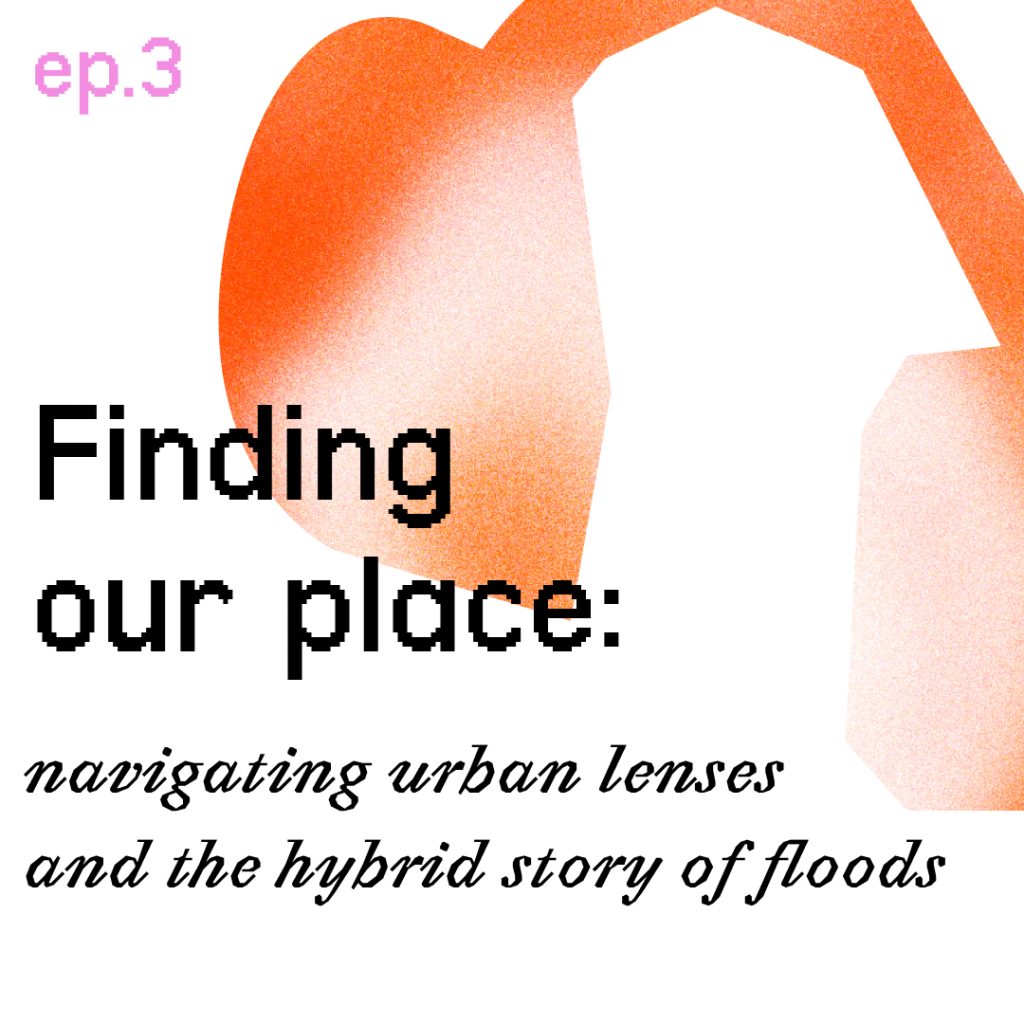
S2425 / CYCLE 1 / EPISODE 3
Finding our place: navigating urban lenses and the hybrid story of floods
The third episode of Urbinary, Finding Our Place: Navigating Urban Lenses and the Hybrid Story of Floods, explores how different epistemological lenses shape our understanding of the urban and its territorial consequences. Through the case of the devastating floods that hit Emilia-Romagna in 2023–2024, the episode questions conventional dichotomies such as city/countryside and urban/rural, showing how they fail to capture the complex socio-natural processes that produce vulnerabilities. Interviews with scholars and activists, including Camilla Perrone, Paolo Pileri, Pascal Bernhardt and Davide Castaldo, highlight the interconnections between extended urbanization, soil consumption, political ecology and grassroots mobilization. The discussion emphasizes that natural disasters are never purely natural, but deeply entangled with political choices, planning failures, and uneven geographies of development. By drawing on perspectives from territorialist political ecology, urban political ecology, and the more-than-human approach, the episode advocates for a shift in planning towards dynamic, process-based frameworks that account for the socio-ecological metabolism of territories.
Subscribe on your favorite platform
Guests
Camilla Perrone
Camilla Perrone is a researcher in Urban Planning Techniques and teaches Urban and Territorial Policies at the School of Architecture, University of Florence. She has been a visiting fellow at York University in Toronto, where she conducted research on multicultural planning. Her current work focuses on territorial planning and interactive design, with research and training activities as well as consultancy for public institutions and foundations on the social construction of urban and regional plans. She contributed to the drafting of the Tuscan regional law on public participation (Law 69/07) and is a member of several international research networks, including INURA (International Network of Urban Research and Action), AESOP (Association of European Schools of Planning), and AAG (Association of American Geographers).
Paolo Pileri
Paolo Pileri is Full Professor of Urban and Environmental Planning at the Politecnico di Milano, where he teaches courses on land use, environmental effects, and ecological urban planning. Trained as an environmental engineer, he has devoted his academic career to studying the environmental dimensions of spatial planning, with a particular focus on soil as a critical and living resource. His research explores the impacts of land consumption, the role of open spaces in urban design, and the relationship between planning and environmental justice. Pileri is the scientific coordinator and founder of several innovative national projects, including VENTO, a 700 km cycling route connecting Venice and Turin along the Po River, which promotes slow mobility and territorial regeneration. He also leads TWIN and BorghiLenti, initiatives that explore new forms of sustainable development for Italy’s inner areas through light infrastructure and community engagement.
Pascal Bernhardt
Pascal Bernhardt is the Director, cameraman, and editor of the documentary Romagna Tropicale. Born and raised in the suburbs of Paris, he has been living in Genoa for over thirteen years. He earned a Master’s degree in Social, Visual, and Cultural Anthropology in 2011 and trained in directing and cinematography through various experiences with independent video collectives. His filmmaking spans music videos, short films, and documentaries, with a strong focus on social and political issues. His work explores existential narratives to reveal how political power, social hierarchies, and economic systems shape individual lives and everyday experiences. For more than a decade, he has led video workshops and created music videos as tools for empowerment, especially aimed at supporting and engaging young people in difficult circumstances. As a freelancer, he works as a sound recordist, cameraman, and video editor, developing a participatory and place-based approach to filmmaking.
Readings
Suggested readings
Lefebvre, H. (1991). The production of space (D. Nicholson-Smith, Trans.). Oxford, UK & Cambridge, MA: Blackwell. (Original work published 1974).
Schmid, C., Karaman, O., Hanakata, N., Kallenberger, P., Kockelkorn, A., Sawyer, L., Streule, M., & Wong, K. P. (2023). New concepts of urbanisation processes: An overview. In C. Schmid & M. Streule (Eds.), Vocabularies for an urbanising planet: Theory building through comparison (pp. 49–68). Basel: Birkhäuser. https://doi.org/10.1515/9783035623017-005
Pileri, P. (2024). Dalla parte del suolo. L’ecosistema invisibile. Bari: Laterza. Retrieved from https://www.laterza.it/scheda-libro/?isbn=9788858155387
Perrone, C. (2023). Insurgent earth: Territorialist political ecology in/for the new climate regime. In M. Kaika, R. Keil, T. Mandler, & Y. Tzaninis (Eds.), Turning up the heat: Urban political ecology for a climate emergency (pp. xx–xx). Manchester: Manchester University Press. Retrieved from https://manchesteruniversitypress.co.uk/9781526167996.
MacGregor, S. (2014). Only resist: Feminist ecological citizenship and the post-politics of climate change. Hypatia, 29(3), 617–633. https://doi.org/10.1111/hypa.12065
Other readings
Bernhardt, P. (2024). Romagna tropicale [Documentary film]. Italy: Independent production. Retrieved from https://www.imdb.com/title/tt32958669